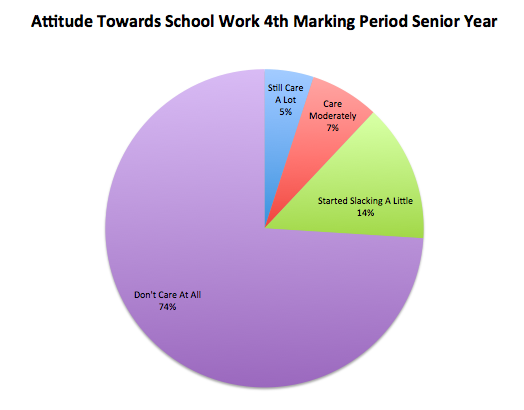
As the home stretch of the academic school year approaches, a contagious affliction begins to creep into seniors everywhere: senioritis. Whether you are a senior planning to go to your next academic chapter in college, excited for graduation or preparing to embark on the next journey in life, senioritis can take over your mind. It can cause a lack of motivation and cause an academic decline at the end of high school for students. However, with this challenge brought to seniors each year arises a new opportunity to learn how to motivate themselves and how to manage a lack of motivation.
Senioritis is a catchy term, but it is also a phenomenon in psychology and the educational system. The textbook definition of senioritis is “ a supposed affliction of students in their final year of high school or college, characterized by a decline in motivation or performance.” Senioritis is usually associated with high school seniors but can affect anyone through their academic journey. Senior Jack McDaniel describes senioritis as “not caring about school or my grades.” Senioritis affects everyone differently and strikes at different times throughout the school year.
The symptoms of senioritis can affect many people in many different ways. Also, it can affect students outside of academics in extracurricular activities. One of the biggest symptoms of senioritis is procrastination. Students tend to delay doing their assignments until the night before it’s due or cram-study right before a test. With procrastination comes rushed assignments, which can lead to worse grades. Senior Adian Lawrence can attest to this. “ I often find myself laying around procrastinating work and feeling lazy. I also complain about school-related things I would not have complained about last year.”
Another symptom of senioritis is a lack of motivation. When this happens, students have no goals, desire or willingness to work. They simply don’t want to do any assignments. Lack of motivation can cause students not to complete their assignments or even students may start to skip class. Senior Jack McDaniel says, “I have no motivation to study or complete my homework.”
On the contrary, senior Ian Robb says, “I haven’t been experiencing senioritis yet. I’m in track, I usually stay pretty busy in life, and always try to stay motivated.” Outside of school, this lack of motivation can cause students to dread extracurricular activities and prioritize leisure over responsibilities.
At times, senioritis may seem unstoppable in students’ minds, but there are many ways for students to regain their motivation. Robb says, “Motivation is important because it gives you a purpose in life and it can strive you to be better. Every successful person has motivation and no motivation can lead you to a dark place.” One of the best ways to increase your motivation is to set clear, achievable goals. One way is to connect every goal to a “why.”
According to Ascend.com, “When you spend time understanding the ‘why’ that’s driving your actions, it’s easier to avoid distractions and focus on pursuing your goal.”

Another way to achieve your goal is to break down your goals. This could be making weekly goals instead of a month-long goal. For example, if you want to finish high school with all A’s, you can break down that goal in many ways. You could break it down into weeks, so you focus on an easier goal to obtain and if you do it for multiple weeks you can end up with that big goal. Another way to break it down could be by each assignment. A third way to help set goals is to incorporate buffer time into these goals. For example, if you think an assignment will take one hour, set aside an hour and fifteen minutes to achieve the task.
Lawrence has used goal setting to increase his motivation. “I had to sit down one weekend and create a to-do list to get studs done that I was behind on and it surprisingly worked.”
On the other hand, McDaniel believes, “I don’t find goal setting to with senioritis.” To make goal setting even more effective, you need to sustain your progress.
According to Harvard Business Review, “Another mental trick involves focusing on what you’ve already done up to the midpoint of a task and then turning your attention to what you have left to do. My research has found that this shift in perspective can increase motivation. For example, in a frequent-buyer promotion, emphasizing finished steps (you’ve completed two of 10 purchases) increased customers’ purchases at the beginning, and emphasizing missing steps (you are two purchases away from a free reward) spurred consumption as buyers neared the goal.” Overall, goal setting is a way to increase your motivation and there are many ways to do it.
A final way to increase motivation is to promote your well-being. Some ways to improve your well-being are taking breaks from prolonged activities, getting enough sleep, eating nutritious meals and relaxing activities. Doing these simple things can help avoid burnout. Additionally, it will help you manage stress, lower your risk for illness, and increase your energy. By prioritizing your mental and physical health you can recharge your brain to be able to focus and motivate more. This recharge will bring motivation and energy toward academic responsibilities. Additionally, the organization helps with motivation because it reduces stress. Robb agreed and said, “Stay busy and stay organized.”
In conclusion, Robb puts it best: “Motivation is important because it gives you a purpose in life and it can strive you to be better. Every successful person has motivation and no motivation can lead you to a dark place.” Also, Robb says “Set goals, reward yourself for big and little things, track your progress, and practice gratitude.
“Senioritis can get the best of you at times but you have to manage and prevent the effects on you. It can affect your motivation inside and outside of school. With all this information in mind, stay on top and don’t let senoritis get you.


























